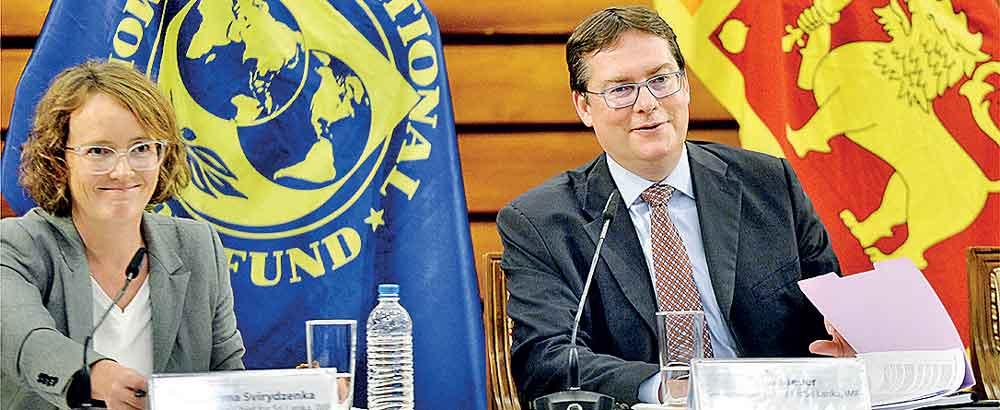Reply To:
Name - Reply Comment

IMF visiting delegation all smiles announcing that the Fund and the Sri Lankan authorities have reached staff-level agreement on economic policies to conclude the third review of Sri Lanka’s economic reform programme supported by the IMF’s Extended Fund Facility (EFF). Deputy Mission Chief Katsiaryna Svirydzenka (left) and Senior Mission Chief Peter Breuer speaking to journalists in Colombo on Saturday.
Pic by Pradeep Pathirana
By Nishel Fernando
The Sri Lankan government has reached an agreement with the International Monetary Fund (IMF) to proceed with its US$ 3 billion Extended Fund Facility (EFF) programme, consenting to adjustments while adhering to the programme’s main “guardrails.”
Despite the landslide mandate secured by the new government, IMF Senior Mission Chief Peter Breuer noted that the challenges facing Sri Lanka remain unchanged.
“Regrettably, challenges in Sri Lanka haven’t gotten less despite the change in the government,” Breuer said, referring to the country’s efforts to recover from the severe economic crisis it faced in 2022.
Breuer made these comments while addressing the end of mission press confernce held on Saturday.
While asserting that Sri Lanka has to think about how to ensure a full recovery from the crisis and how to have stable and inclusive growth, the IMF representative noted that the main guardrails of the program are structured in a way to facilitate the same.
“Within those guardrails, a review is an opportunity to take stock of developments and look at any adjustments to the programme.
“We discussed their preferences on how to adjust the programme and managed to reach a staff-level agreement on the way forward that stays within the guardrails of the programme and allows authorities to make amends in line with their priorities. They will put them in their budget proposals at the appropriate time,” he elaborated.
The key guardrails include achieving a primary surplus, ensuring revenue targets, and maintaining the quality of fiscal measures.
The staff-level agreement reached for the third review of the EFF programme is subject to several prior actions, primarily linked to the 2025 budget, before securing IMF Executive Board approval.
“There are some prior actions, mostly related to the budget. Because of elections, the budget process is taking place later this year. We will be interested in convincing ourselves that this budget is in line with the programme objectives, so we will be having very close discussions with authorities,” Breuer said.
However, he refrained from disclosing specifics about the fiscal adjustments the government plans to incorporate in the upcoming budget.
During the election campaign, the National People’s Power (NPP) pledged to lower taxes and reverse certain proposed tax measures included in the 2025 budget.
Breuer defended the IMF-backed tax proposals, emphasising that low tax revenue was a significant factor in the current crisis and that the proposals do not burden the poor.
“It’s important to remember who pays taxes in Sri Lanka. It’s really about the top 20 percent of income earners. The top 20 percent in income distribution are making all the tax contributions. The poor don’t pay taxes. If taxes are increased, it affects a certain section of society, but not the poor,” he explained.
While acknowledging the strain of high prices on lower-income earners, Breuer stressed the need for incomes to rise to address these challenges. “The priority now is to get incomes to catch up with it,” he added.
Breuer highlighted the failure of the previous government to meet minimum social welfare spending targets and noted the current administration’s “strong commitment” to meeting these targets to support the poor and vulnerable.
He also underscored the importance of political stability for the success of economic reforms.
“Political stability is a very important part in the context of economic reforms. A government with a strong mandate bodes well for political stability, and we take comfort from the commitment this government has given,” he said.Breuer expressed confidence in restoring the IMF programme to its original timeline after delays caused by the elections.
“As soon as policy remains on track, we will find a way to make up for those delays to bring the programme back to its original schedule,” he said.
He also commended the progress on external debt restructuring. “This process will go forward swiftly,” he added.
The IMF team held meetings with President and Finance Minister Anura Kumara Dissanayake, Labour Minister and Deputy Minister of Economic Development Prof. Anil Jayantha Fernando, Deputy Minister of Finance and Planning Dr. Harshana Suriyapperuma, Senior Economic Advisor Duminda Hulangamuwa, Central Bank of Sri Lanka Governor Dr. P. Nandalal Weerasinghe, Secretary to the Treasury K. M. Mahinda Siriwardana, and other senior government and CBSL officials.
The team also met with parliamentarians, representatives from the private sector, civil society organisations, and development partners.